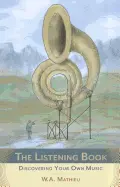
The Listening Book - by W.A. Mathieu
ISBN: 9781590308318Date read: 2021-09-03
How strongly I recommend it: 10/10
(See my list of 430+ books, for more.)
Go to the Amazon page for details and reviews.
Everyone should read this book of little essays about listening. It teaches your ears to pay more attention. It calls your attention to sounds you hadn’t noticed. It’s beautifully written, and makes your life better. I read it twice, 24 years ago, and reading it again this week, it was even better than I remembered.
my notes
The eyes are hungry. They eat brain energy. When you close your eyes your brain opens to your ears. When you open your eyes, now the brain is crowded.
When people are listening intently with their eyes open, a strange thing happens. Their eyes roll up a little. It means that the hearing, just for a moment, has become hungrier than the vision.
Our aging cat utters a soft meow of complaint that somehow reminds me of my Grandma Clara, long dead.
In the lulls I hear traffic from the through road, two miles north.
Our dog is lying half-asleep under the quince bush. When he stirs I hear his fur against the grass.
My breathing.
I am now aware of two cicada type of insects, both scraping their knees. In front of me, nearby, is the slower one; the one behind me is faster, but farther away. I don’t know how long they have been singing.
I absent-mindedly rub the fingers of my left hand together: the high-pitched swish of skin on skin.
I decided to see what would happen if I stood two feet in front of a speaker twice my height and cranked to the max.
Two things happened:
I experienced a blend of ecstasy and pain so intense that I will remember it forever.
And I went a little deaf.
A tough lesson.
But I learned that the ear is a haven.
Pay attention to what you are hearing, what you are subjecting your ears to.
You have to know when to say “come in” and when to say “stay out”; that is basic to life.
What is not obvious is how to do it consciously, deliberately, with your sense of hearing.
When you carry an infant around with you, cradling it against the world, you come to understand the equation between its vulnerability and your caring.
When you cradle your ears they become increasingly precious to you, and you seek out new ways to give them love.
Stand up for your rights.
When my dentist sees me coming he turns off the Muzak. (“It’s such a relief when you’re here,” whispers the hygienist.)
It’s even all right to ask your friends nicely to turn off the TV they haven’t been watching.
Care.
Don’t give up and let your ears gradually grow closed.
You can always find a way of upgrading the sound in your space, or your perception of it, if you care enough.
And when you do care, the reward is so precious: Murmurs. Lullabies. Rain. Waves of cicadas under the moon.
Sounds, sufficiently diffuse or distant not to offend you or hook you into their drama.
Create a space that not only protects you from unwanted sound but also releases you from any impulse to close your ears.
The exercise is to open up, as though your ears are listening through a microscope.
Unlistening means clearing sounds from their associations, which are often unconscious. Make them conscious.
Strip all the layers of meaning away from sounds.
Beyond people’s words is the true meaning.
The cadence of desire on their voices - the rising and falling prototype of musical cadence.
It is there, raw, every time someone speaks.
Speech takes on the pristine clarity of pre-language.
The more you listen the more you hear.
Two music boxes, or three, at once.
A stretched string shows how music transforms energy.
Dancers need music, but walkers are their own music.